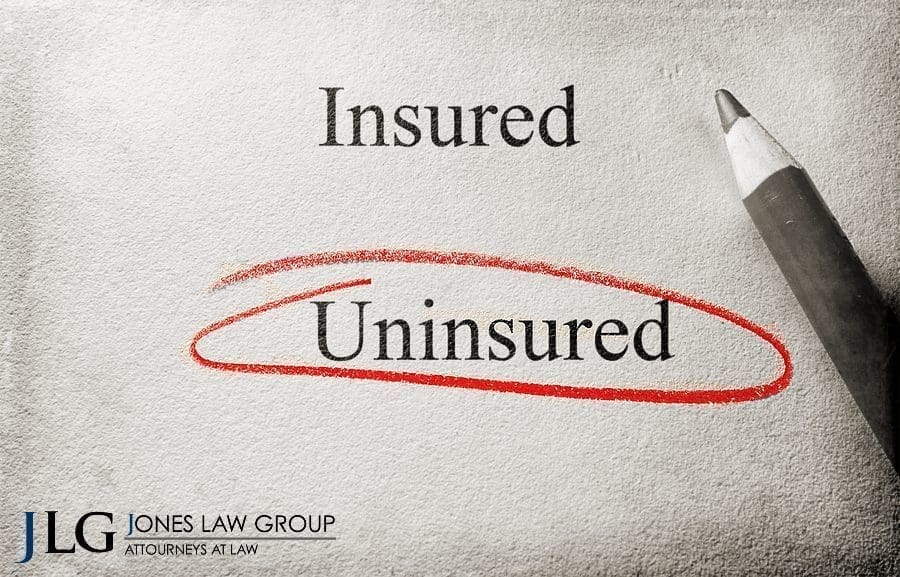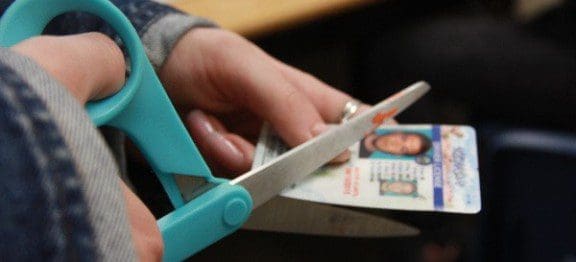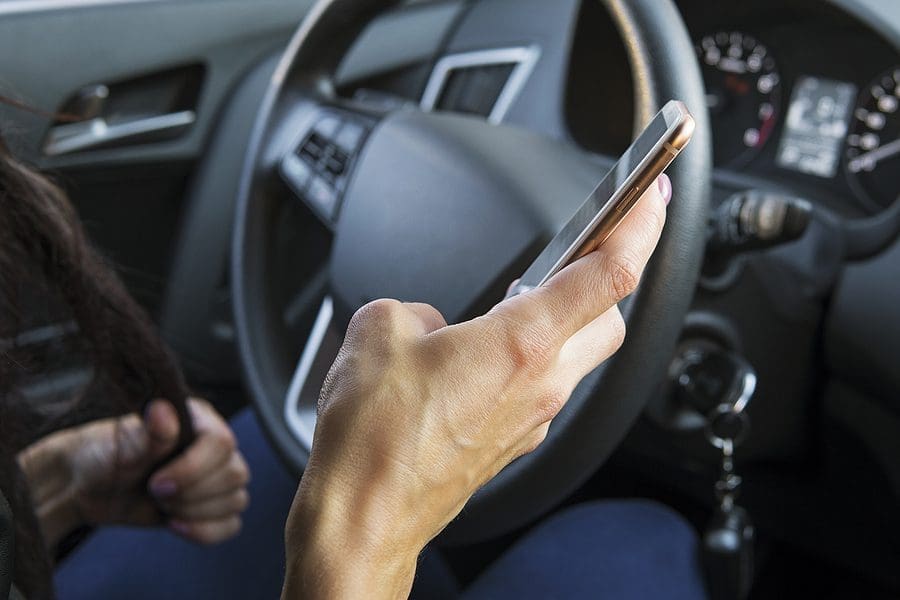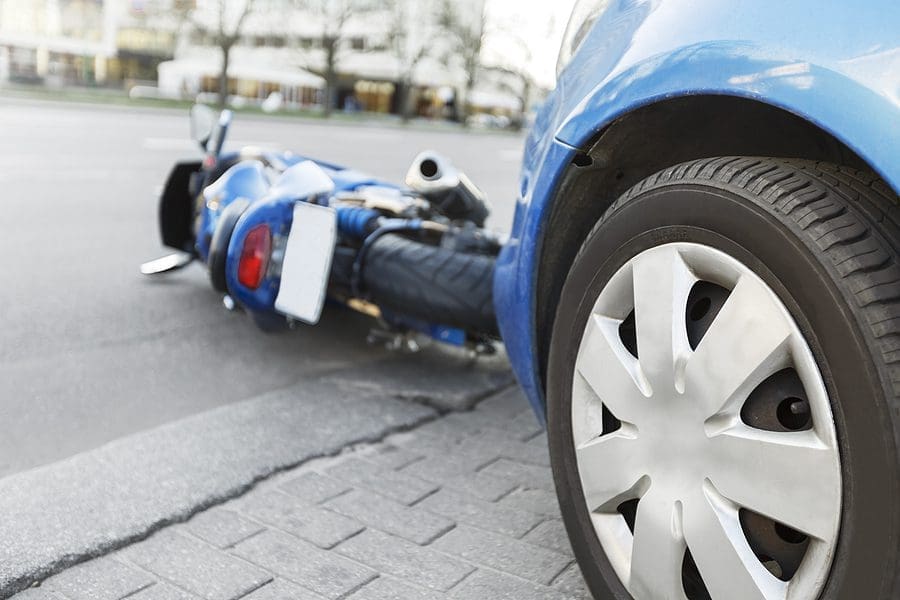JONES LAW GROUPYour Lawyers for Life! Personal Injury Law Firm in St. Petersburg

Why Won’t My Car Accident Lawyer Sue an Uninsured Driver? According to the Insurance Information Institute, 26.7% of Floridians have no insurance. That means if you get in an accident in Florida, there is a very good chance the person that caused the car crash will have no insurance. This could potentially leave the innocent […]
Call our personal injury law office directly at (727) 512-9847
At Jones Law Group in St. Petersburg, FL, we would like to hear from you. Contact us for a free personal injury case consultation.
Call our personal injury law office at (727) 512-9847
Get educated on the Florida's personal injury laws and more.
According to the Insurance Information Institute, 26.7% of Floridians have no insurance. That means if you get in an accident in Florida, there is a very good chance the person that caused the car crash will have no insurance. This could potentially leave the innocent victim on the hook for thousands of dollars in car repair bills and medical bills. Florida leads the nation in the dubious distinction of have the most uninsured drivers on the road.
*Data source: iii.org/fact-statistic/facts-statistics-uninsured-motorists
These numbers are frightening, but Florida also has the lowest insurance minimums in the entire country at 10/20. Meaning that no matter what your injuries may be, the insurance company will only pay you $10,000.00 for your injuries.
Too many times I have had to sit down with a client who was in a car accident or motorcycle accident with an uninsured driver and tell them we cannot sue the driver that caused the accident. The next question invariably is, “why can’t we sue the driver that caused my accident?” The answer is of course we can sue the driver that caused the accident. The issue is that it is just not generally practical because Florida law protects debtors. Personal injury cases are expensive to try and if someone is hit with a large judgment…they usually just file bankruptcy and all of the time, effort and money to obtain that judgment is wasted.
At Jones Law Group, we will run asset search on the uninsured motorist that caused your injuries to ensure they have no assets. It is a long shot, but we feel we need to exhaust every possible avenue of collection for our clients.
Insurance jargon can be confusing and even daunting for the average person. What does it mean when I say that Florida has the lowest minimum insurance at 10/20? It means if you get in an accident, the insurance will pay up to $10,000 per person with a maximum of $20,000 on everyone injured in the accident. If the insurance is a 50/100 policy that means it will pay $50,000 per person up to a maximum of $100,000 for everyone injured in the accident.
Here is a list of insurance terms that you might encounter when dealing with your car insurance.
Adjuster: The person who investigates and settles insurance claims. This person is employed by the insurance company and will attempt to settle the claim for as little as possible.
Agent: A person who sells insurance on behalf of an insurance company. Some insurance agents are dedicated to a single company and others can write policies for many companies.
At-Fault Accident: Any accident, regardless of size or amount paid, in which the driver was wholly or partially at fault. At fault accidents will cause a substantial jump in your insurance premiums.
Bodily Injury (BI): Injury, sickness, disease or death that results from an auto accident.
Bodily Injury Liability Coverage: Protects your assets if you are responsible for an accident where other people are injured or killed.
Claim: The amount of money a person(s) believes he or she should be paid by an insurance company as a result of an accident. Can be for property damage, bodily injury or both.
Claimant: A person who makes an insurance claim.
Collision Coverage: Pays to repair or replace your vehicle if you hit something else and no one else is at fault. Does not include collision with animals.
Comprehensive Coverage: Provides financial protection for damage caused by a number of causes other than an auto accident, including vandalism, fire, theft, flood, falling tree limbs, hail and collision with animals.
Coverage: The insurance protection in a policy.
Declarations Page (Dec Page): Forms part of the policy and contains information such as when, where and to whom the policy applies.
Deductible: The amount of the loss the insured agrees to pay before the insurance company pays – up to the policy limits – if one applies.
Effective Date: The starting date of the insurance policy.
Full coverage: Though there is no such thing as “full coverage,” it is a common term used to describe the amount of auto insurance coverage someone has, and typically implies that the policy has at least liability, comprehensive and collision coverage.
Gap insurance: Lease and loan gap insurance coverage helps pay the difference between the actual cash value of the vehicle and the amount still owed on the lease or loan in the event of a total loss.
Insurance Amount/Limit: The maximum amount/limit an insurance company would pay in the event of an accident.
Insured: The person protected under an insurance policy.
Insurer: The insurance company that provides insurance coverage and services.
Lapse: A policy that expires or cancels because the insured did not pay the premium amount.
Mandatory Insurance: When state law requires that auto owners/operators have auto insurance. Requirements vary from state to state.
Medical Expense Coverage (Med Pay): This pays medical expenses of the policyholder and any passengers injured while in the insured auto. This coverage also pays the medical expenses of the policyholder and members of his or her family who are injured while riding in any other auto or struck by any auto.
Minimum Limits: The minimum insurance limits as required by your state’s laws.
Named Insured: The first person named on the application is the primary named insured, and the second person named on the application is the secondary named insured. These are the policyholders named on the declaration page.
No-Fault Automobile Insurance: Coverage to compensate victims of automobile accidents without having to prove who was at fault in causing the accident
Non-renewal: When an insurance company decided not to renew a policy.
Personal Injury Protection: Often referred to as “PIP” or “No-Fault” insurance. PIP pays covered medical expenses, and in some states lost wages and other damages — up to the limits of your policy — if you are injured in an auto accident, regardless of who is at fault.
Policy: A formal written insurance contract describing the term, coverage, premiums and deductibles.
Policyholder: The person who applied for, pays for, and is issued the insurance policy.
Premium: The amount of money an insurance company charges to provide coverage.
Property Damage Liability Insurance: Covers the insured if legally responsible for the damage to the property of others.
Rental reimbursement coverage: Reimburses you a set daily amount for a rental car if your car is being repaired due to damage covered by your auto insurance policy.
Subrogation: In insurance, subrogation substitutes one party (insurer) for another party (insured) in order to pursue any rights that the insured may have against a third party who is liable for a loss. For example: If you are injured and it is another person’s fault, your insurance company may pay your claim and then pursue (collect) the damages from the other person or his or her insurance carrier.
Uninsured motorist coverage (UM coverage): Helps pay for damages to your insured car when the damages are caused by a driver who is uninsured or underinsured or caused by a hit-and-run driver. Not available in all states. This is the most important coverage you purchase because it protect you and the people in your car if you are injured by an uninsured driver or a driver that does not have enough coverage to compensate you for your injuries.
PIP insurance is the reason people refer to Florida as a no fault state. Every insurance policy provides the driver $10,000.00 in immediate coverage for payment of medical bills. When you are injured in a car accident or motorcycle accident regardless of fault, your own insurance company will immediately begin processing medical bills on your behalf. The goal was to reduce out of pocket expenses for the driver instead of having medical bills pile up and potentially ruining your credit.
“Full Coverage” auto insurance is a myth. If you are asking an insurance agent about full coverage, she is likely discussing auto insurance that includes the following coverages:
I have clients come and proudly tell me they have “full coverage” insurance. And truthfully, they are doing better than most Floridians, but full coverage is by no means complete coverage. The list below is by no means complete, but several of the coverages are important to many people and there is one that should be important to everyone and that one coverage is uninsured/underinsured motorist coverage.
Whether your accident happened on US 19N, or at a dangerous intersection on Park Blvd, 34th St or 49th St or anywhere in between, it is important that you seek experienced representation. Jones Law Group is an award winning law firm that has fought for the residents of Pinellas Park when they have been injured in an accident.
Our dedicated team will thoroughly investigate the factors that led to your accident and aggressively seek compensation from each responsible party. For a free consultation, contact us online or by phone at 727-571-1333.

Mechanical failures due to poor maintenance, unstable or unsecured loads, truck driver fatigue, reckless driving practices, and other forms of negligence contribute to the 8 types of truck accidents. Summary The types of injury that a victim suffers will often depend on the type of truck accidents they’re in. There are actually several different ways […]

E-Bike Accidents in Tampa: New Laws, Rising Injuries & Your Legal Rights in 2025 Electric bicycles have transformed Tampa’s transportation landscape. From the bustling streets of downtown to the Riverwalk and Bayshore Boulevard, e-bikes offer an eco-friendly alternative to traditional commuting. But with popularity comes risk—and Tampa is experiencing a dramatic surge in e-bike accidents. […]

By: Heath C. Murphy + – Personal Injury Imagine the following scenario. You are driving along Park Boulevard in Pinellas Park and as you change lanes in order to make an approaching turn, another car rear ends your vehicle. He claims that you cut him off and slammed on your brakes. After the car accident, […]

Is texting and driving more dangerous than drunk driving? According to testing by Car and Driver, the answer is a resounding yes. Car and Driver set up test conditions on an airport runway to determine how two driver would react when reading, texting, and while drunk. The test gauged reaction times by having the drivers […]

If you are injured in a motorcycle accident, you may be eligible for compensation for damages you incurred. Motorcycle accidents can cause severe injuries such as traumatic brain injury, spinal cord injury, and road rash. Motorcyclists don’t have as much protection as motor vehicle drivers do, so some types of injuries can be much more […]

Were you hurt in a motorcycle accident, a slip and fall, or any other accident caused by someone else’s negligence? If so, you might be taking legal action to pay for your medical bills, lost wages, and other accident-related expenses. It’s only natural that you’d want to know how long it will take to receive […]
Speak with us before time runs out! In Florida, you have a limited window to file a personal injury case, so speak to an Attorney today.
Call our personal injury law office directly at (727) 512-9847
Jones Law Group is a dedicated personal injury lawyer in St. Petersburg, FL, serving the Tampa Bay area since 2006. Our experienced attorneys specialize in car accidents, slip and fall cases, employment law disputes, construction law issues, and overtime wage claims, fighting for maximum compensation on a contingency fee basis. Contact us for a free consultation to discuss your case.
Call our personal injury law office at (727) 512-9847
© Copyright 2006–2025 Jones Law Group Attorneys at Law. All rights reserved. Privacy Policy Terms of Use
Attorney Advertising.
The information on this website is for general information purposes only. Nothing on this site should be taken as legal advice for any individual case or situation. This information is not intended to create, and receipt or viewing does not constitute, an attorney-client relationship. Past results do not guarantee similar outcomes.
Are you injured or wronged and interested in a consultation? Fill out the form for a free consultation with us.